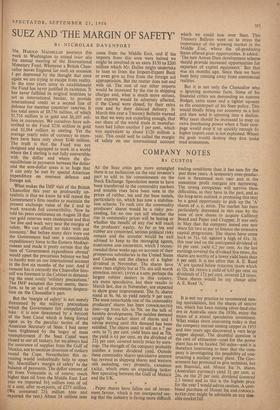SUEZ AND THE MARGIN OF SAFETY'
By NICHOLAS
DAVENPORT
What makes the IMF visit of the British Chancellor this year so profoundly un- realistic is that we know he will repeat the Goverhment's firm resolve to maintain the present exchange value of the £ and to work towards full convertibility. Now he told his press conference on August 28 that our gold reserves were inadequate and that 'we live and work very near the margin of safety. We can afford no risks with our economy.' But before many days were out the Government had sent a considerable expeditionary force to the Eastern Mediter- ranean and made it pretty certain that the item of 'Government expenditure abroad' would upset the precarious balance we had so hardly won on our international account in the first six months of the year. And if rumour has it correctly the Chancellor him- self was foremost in the Cabinet in demand- ing the most costly 'military precautions.' The IMF escapism this year seems, there- fore, to be an act of uncommon despera- tion on the Chancellor's part.
But the 'margin of safety' is not merely threatened by the military precautions which the Government felt compelled to take : it is now threatened by a boycott of the Suez Canal which is being forced upon us by the peculiar tactics of the American Secretary of State. I had never been frightened by the bogey of mass unemployment if the Suez Canal were closed to our oil tankers, for wekalways had the assurance of supplies from the Gulf of Mexico, not to mention diversion of tankers round the Cape. Nevertheless this re- routing would undoubtedly help to upset Mr. Macmillan's 'margin of safety' in the balance of payments. The dollar content of oil from Venezuela is, of course, much higher than oil from the Middle East. Last Year we imported 36+ million tons of oil at a cost, after re-exports, of £275 million. (We consumed 23+ million tons and exported the rest.) About 24 million tons came from the Middle East, and if the imports from this area were halved we might be involved in an extra $150 to $200 million which Mr. Dulles might undertake to loan us from the Import-Export Bank or even give us free from the foreign aid appropriation. But the matter does not end with oil. The cost of our other imports would be increased by the rise in shipping charges and, what is much tnore serious, our exports would be adverSely affected, if the Canal were closed, by their extra cost and by their delayed delivery. In March this year a Treasury Bulletin warned us that we were not exporting enough, that our share of the world trade in manufac- tures had fallen another 1 per cent., which was equivalent to about £120 million a year. This could well be called the margin of safety on our international account which we could lose over Suez. This Treasury Bulletin went on to stress the importance of the growing market in the Middle East, where the oil-producing States offered great opportunities. It added : 'The new Aswan Dam development scheme should provide increased opportunities for exporters of capital equipment? But that was six months ago. Since then we have been busy running away from commercial realities.
But it is not only the Chancellor who is ignoring economic facts. Some of his financial critics are demanding an autumn Budget, extra taxes and a tighter squeeze as the counterpart of his Suez policy. This would finally bring our economy to a halt and then send it spinning into a decline. Why taxes should be increased to mop up extra purchasing power when a Suez stop- page would mop it up quickly enough by higher import costs is not explained. Whom the gods would destroy they first make mad economists.


































 Previous page
Previous page